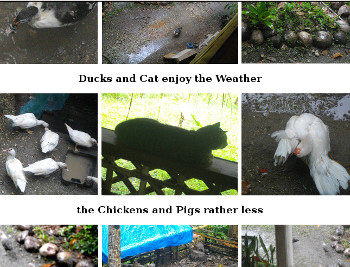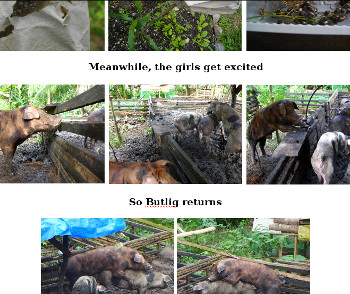 January
February
January
February
Plants:
In many ways it has been a difficult year.
Last years drought also continued over into the first part of this year -although not so bad as last year. The rest of the year was characterized by frequent and sometimes heavy rains as a counter balance to the earlier drought.
The sudden influx of water created problems with flooding, particularly in the pig pens -as well as creating problems for some plants due to water-logging.
However, in general the garden seems to have not only recovered but also improved due to the many sunny periods that interspersed the rain.
Although not many edible crops have been harvested this year -with the exception of the patola and sinkemas - most beans as well as sinkemas and patola have produced enough seeds for planting again next year. Alubati, kangkong, talinum and camote tops are gradually being spread throughout the garden. Ginger and turmeric are also doing well.
Animals:
Pigs:
Three successful farrowing s this year -although there have been some deaths (in the new year) through crushing.
Goats:
Not much activity from the goats. One male kid born on New Years Day (later sold) but nothing else since then. Female goat is suspected of being pregnant but unconfirmed.
The male goat has fathered a few kids for the neighbours
Ducks:
The ducks have not been laying for most of the year -for unknown reasons. In autumn a number of eggs were suddenly laid -but all proved infertile.
Just as we were planning to replace the male duck, he suddenly became sexually active again. We suspect nutrition might be the answer -now the ducks can steal high quality pig food from pregnant and nursing sows.
Chickens:
While the duck population has dwindled (due to culling plus a pause in breeding) the native chicken population has increased -providing both eggs and chicks. However, mortality rates under chicks can be fairly high -ranging from 100% to 30% depending on the mother. Generally, hens are left to fend for themselves.
Fish:
The Tilapia are quite skillful at avoiding capture -and multiply freely in the pond.
However, in December, while Fatima and I were out shopping, there were two workmen here putting the final touches on the pig pens. There was no meat in the house (the holidays had upset our shopping routine) -and our housekeeper Penny was preparing a vegetarian lunch. Naturally, the lads were not so happy about that: They got a few fish hooks, and went into our garden to catch three Tilapia from the fish pond..... Which Penny then cooked for lunch. Perhaps there is such a thing as a free lunch after all....
A year for consolidation:-Drainage, storage and disposal
1. Evaluate and possibly rethink livestock breeding programmes
-pigs, ducks, goats
2. Evaluate and possibly rethink livestock accommodation
-pigs
(breeding sows, boars, fattening pigs)
-ducks, goats?-get rid of No.One (Sell or slaughter)?
-sell one boar to AI technician?
-keep other boar with sow until heavily pregnant?
(work with "associates" to help reduce effort by sharing)
3. Develop water management system (French Drains, Water Gardens, etc.):
- -Fill drainage channels and cover key paths with porous stones (semi-French Drain) as part of integrated water management scheme.
- -Drainage channels (filled with stones)
- -to prevent run off (from roofs and paths) running into pens....
- -around (some) garden plots (maybe linked -to form drainage network)
- -Natural paths, stone paths and grass paths
Maybe solve muddy pens by moving to (newly built) pens and sowing old ones with grass and other seeds to reduce clay content of soil.
Hydroponics -bamboo rafts -or even (edible) water plants?
Plastic tunnel "water stills" to preserve plants?
Continue water conservation projects -but with emphasis on "low maintenance" gardening.
4. Develop planting scheme
- -Season starting in May, after the dry season has ended
- -Move emphasis away from trying to get things to grow -and more towards maintenance and harvesting....
- -More emphasis on plant care -in an attempt to increase production for animals and humans -as well as propagation
- -Sort plants by size more effectively to prevent choking of small plants
- -Plant beans with (one or two) tall stick(s) -one plant to a patch
- -Temporary fences around individual vegetables when seeding?
- -Make more use of "wild" areas for hardy plants such as beans, Saluyot, etc...
- -Plant seeds amongst weeds to give protection from chickens?
5. Investigate improving roof of living quarters
-Palm fronds very nice, but present problems of maintenance and finding labour for repair
6. Make a garden plan?